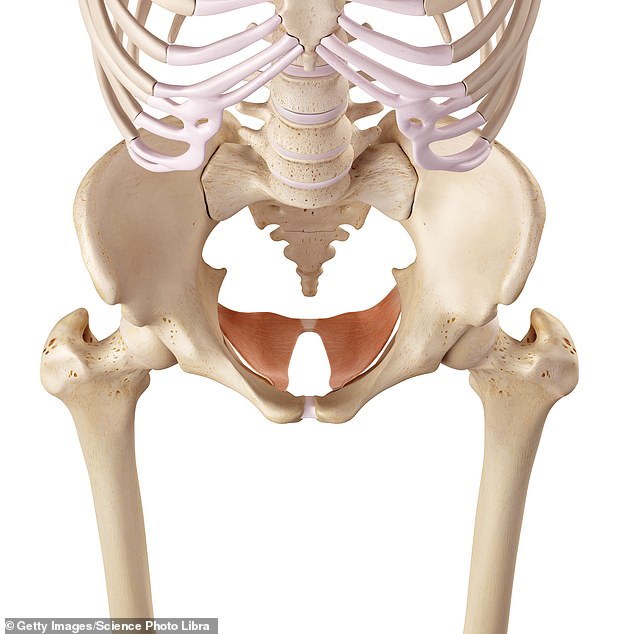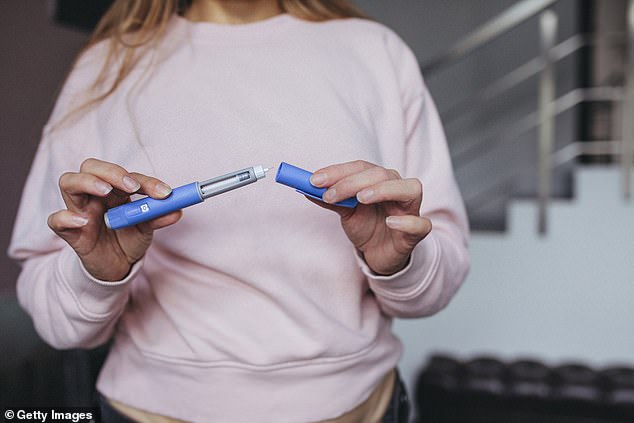Ozempic has been hailed as the medical development that could change the face (and size) of society, saving the NHS millions on treating conditions such as type 2 diabetes and offering many people a straightforward way to shift stubborn pounds.
However, as fat jab users are gradually discovering, they’re not without their drawbacks, from the so-called ‘Ozempic face’ (encompassing sunken eyes and folds at the corner of the mouth) to the skinny, veined ‘Ozempic hands’ spotted on many a celebrity. And now there’s another symptom to look out for: Ozempic vagina.
Dr. Galyna Selezneva, an award-winning aesthetic doctor in London’s Knightsbridge, says half her clients are now on weight loss jabs, and in the past three years she has seen a dramatic rise in those using them ‘suffering from a “strange feeling down below”, as they put it’.
It’s this rapid increase in symptoms that has led Dr Selezneva to identify a phenomenon known as ‘Ozempic vagina’, which can impact the pelvic floor and labia in particular.
The pelvic floor muscles sit at the base of the pelvis, keeping the bladder, uterus, vagina and bowel in the right place. As many women are aware, it’s important to keep this set of muscles active, as they’re required for good bladder and bowel function. Strong pelvic floor muscles also boost core stability and improve your sex life. However, Dr Selezneva believes this strength could be ebbing away as a result of injecting weight loss medications.

Ozempic vagina effects the pelvic floor muscles, which sit at the base of the pelvis, keeping the bladder, uterus, vagina and bowel in the right place.
One of the reasons for this could be the connection between fat-busting jabs and a reduction in muscle. Research suggests that rapid weight loss from taking GLP-1 medications like Ozempic and Wegovy can cause a decrease in muscle mass, and this, Dr Selezneva believes, can impact the group of muscles that make up the pelvic floor. ‘Medication-driven rapid weight loss can strip away muscle all over the body, as well as fat’, she explains.
Constipation and other digestive issues are known side effects of Ozempic, and this can also impact the pelvic floor, says Dr Selezneva. ‘Diarrhoea and frequent bowel movement can strain these muscles, especially if you’re unable to access a bathroom promptly and have to hold it in longer than desired,’ she says. ‘Conversely, constipation can cause excessive straining during bowel movements, leading to tension in the pelvic floor muscles, which can in turn worsen constipation and may contribute to issues like pelvic organ prolapse or urinary incontinence.’
Of course, few women starting on weight loss injections would ever foresee it leading to incontinence – particularly as obesity exerts pressure on the bladder, and is therefore a known factor in urinary incontinence. However, Dr Selezneva says ‘rapid or sudden loss of excess weight can cause unwanted shifts in the position of the pelvic floor muscles, thereby resulting in temporary incontinence.’
Dr Selezneva has also seen pelvic floor issues negatively impact women’s sex lives. Women suffering from Ozempic vagina ‘feel very insecure down below,’ she explains. ‘The feeling of looseness definitely affects their sex life as they feel far less confident.’ This is not helped by Dr Selezneva’s assertion that rapid weight loss can cause ‘visible sagging of the labia or vagina because of overall fat and volume loss.’ As well as pelvic floor issues, some women are coming to see her with ‘loose labia skin’ after shifting the pounds. ‘It’s also common for rapid weight loss to cause the labia to suddenly feel out of proportion compared it previously felt,’ she adds.
Jo 31*, from London, started using weight loss medication several years ago after struggling to reach a healthy BMI. While she was happy to lose just over four and a half stone after having the injections, she says ‘everything felt out of place, including my vagina. It felt like a post-pregnancy vagina. While I had gained confidence physically thanks to my weight loss, ironically I lost confidence mentally, knowing things didn’t feel right.’

According to Dr Selezneva, the benefits of weight loss jabs can outweigh the pitfalls; but awareness is key.
So should women who are on weight loss injections – or considering starting them – be concerned about Ozempic vagina? Dr Shazia Malik, a consultant obstetrician and gynaecologist says the likelihood of experiencing any of these symptoms would depend on a number of factors including how much weight you lose (the more extreme your weight loss, the more likely you are to feel changes in the rest of your body) and your age. ‘After the menopause, the tissues around the vulva and vagina are less thick and supported,’ she explains. ‘Using weigh loss injections may exacerbate that if you’re peri-menopausal or post-menopausal’, but in younger women it’s less likely because ‘they have a much better oestrogen supply.’
Dr Malik also flags the impact Ozempic and other fat jabs can also have an impact on your gut microbiome, which is closely connected to the vaginal microbiome. ‘Weight loss injections can definitely affect your gut health because they can give you diarrhoea, nausea and slow down the gut transit of food,’ she says. ‘They will have an impact on the normal microbiome of your gut, and that can affect the microbiome of your vagina as well.’ The relationship between the gut microbiome and the vaginal microbiome means that if you have ‘an unhealthy mix of gut bacteria, that can predispose you to vaginal infections, discharge or vaginal dryness,’ says Dr Malik. However, she stresses that it is not just weight loss injections that could upset the microbiome – what you eat plays a big role too – and likewise that many factors feed into how your vagina and vulva feel, so blaming Ozempic might be too simplistic a route. ‘To boil it down to one single factor doesn’t help women,’ she says. ‘We should be looking at them as a whole.’
Rather than panic about the potential impacts of weight loss jabs on your vagina, Dr Selezneva suggests being aware of the pitfalls – and getting ahead of them – is key. You can help to maintain and build muscles, for example, by making sure you eat enough protein (‘if you can’t force yourself to eat then ensure protein supplementation,’ says Dr Selezneva) and practice exercises targeted towards the pelvic floor (the Squeezy app is brilliant for guiding you on this, and reminding women to do their exercises). ‘If you preserve and enhance those muscles, your future self with thank you for it,’ she concludes.
*Names have been changed











